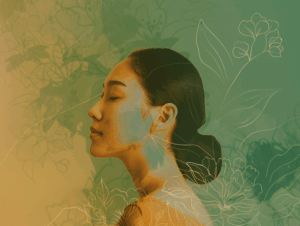
Some of the most meaningful developments in beauty today are emerging not from the lab bench, but from centuries-old traditions. These indigenous systems—Ayurveda, Traditional Chinese Medicine (TCM), Jamu, African, Māori, and Amazonian practices—are all rooted in a profound connection between mind, body, spirit, and the natural world. As anxiety, chronic stress, and feelings of systemic imbalance rise in modern life, people are looking backward to move forward. The rediscovery of traditional healing systems offers not just cosmetic results, but a deeper kind of alignment—one that speaks to emotional grounding, energetic renewal, and a more resilient sense of well-being.
At the same time, technological advancements in the beauty space—particularly lasers and other non-invasive procedures—now deliver results that far surpass traditional skincare in terms of appearance-focused outcomes. However, these clinical treatments often lack a narrative or emotional resonance. There is no ritual, no sensory engagement, and usually not focused on deeper personal meaning. As a result, skincare is evolving into something more than topical efficacy. It is focusing on what is missing – a holistic experience—a practice of self-connection that helps individuals not just look better, but feel better. This is where traditional medicine offers invaluable guidance: in creating beauty rituals that align with the whole person.
Beauty as the Outcome of Inner Balance
In Ayurveda, ojas is considered the essence of vitality and immunity. In TCM, qi refers to the body’s life force. Jamu emphasizes daily plant-based tonics for internal balance. African traditions value holistic care, with shea butter and moringa oil historically used to condition both skin and spirit. The Māori of New Zealand embrace a wellness model known as hauora, integrating physical, emotional, and spiritual health.
These traditions all share a central tenet: beauty arises when the internal and external are in harmony. Today’s formulations, inspired by this worldview, aim to support gut health, emotional regulation, hormonal balance, and inflammation control. They signal a shift from “quick fixes” to integrative approaches—reconnecting people to themselves.
Rituals Rooted in Self-Connection
Traditional beauty rituals have always been more than skin-deep. Ayurvedic oil massage (abhyanga), Chinese gua sha, African and Māori skin therapies—these are expressions of intentional care. In Indonesia, the roots of the word “Jamu” combine “Djampi” (prayers or healing incantations) and “Oesodo” (health), symbolizing the spiritual and medicinal duality of their healing practices.
In a culture where speed, stress, and performance dominate, these rituals provide grounding. Scientific studies in neuroplasticity suggest that intention-setting and mindful practices influence the brain’s default mode network, which governs self-perception and emotional regulation. This lends new credibility to ancient practices—ones that offered comfort, resilience, and reconnection.
Botanical Formulations Informed by Tradition
Across all traditions, nature is both healer and teacher. Ayurveda employs turmeric, neem, and amla. Jamu draws on tamarind, galangal, and ginger. African healing includes baobab, marula, and black seed oil. Māori traditions use kawakawa and harakeke (flax) for their antimicrobial and barrier-supporting properties.
These botanicals are not just actives. They are cultural symbols, connected to land, heritage, and community. Their use in modern skincare introduces an emotional and ecological depth that enhances user connection—especially important in a world where in-office treatments can deliver faster visible results, but rarely emotional resonance.
Emotional States and Skin Expression
Traditional medicine has always acknowledged what modern science is beginning to affirm: the mind and skin are deeply connected. Stress can trigger or exacerbate conditions like acne, eczema, and rosacea. Indigenous practices often use song, breath, and plant aromatics to soothe emotional turbulence as part of healing rituals.
In the absence of a spiritual or sensory component, many high-tech procedures leave a void. By contrast, beauty rituals rooted in ancestral wisdom help individuals feel cared for in ways that transcend results. They restore agency and intimacy in the self-care process.
Fragrance and Mood: A Developing Connection
The limbic system in the brain processes both scent and emotion—explaining why certain fragrances can calm or uplift. While science continues to study the extent of these effects, traditional cultures have long embraced aromatics for spiritual and psychological support.
In Jamu, African, and Māori traditions, aromatic herbs play a central role in purification, ritual, and emotional grounding. These olfactory cues form part of a wellness experience—one that modern skincare is beginning to replicate through sensory-forward product design.
Sustainability and Ancestral Models of Stewardship
The environmental ethos embedded in traditional medicine is perhaps one of its most prescient contributions. Jamu emphasizes fresh, local sourcing. African and Amazonian practices emphasize regenerative harvesting. Māori traditions promote custodianship over land and species.
In today’s climate-aware beauty industry, these models offer not only sustainability, but narrative—one that resonates with consumers seeking ethical, earth-honoring choices. They provide emotional alignment between product and planet.
The Future of Beauty Comes from Yesterday’s Wisdom
Beauty today is no longer defined solely by smooth skin or youthful features. It is increasingly about how one feels—physically, emotionally, energetically. High-tech beauty can deliver appearance changes, but traditional systems offer something that complements it: continuity, connection, and care.
Skincare can be used as a daily opportunity to engage the senses, regulate the nervous system, and honor personal rituals. As indigenous practices from around the world return to the spotlight, they are helping reshape beauty as a multifaceted experience. The future lies in integration—where high-performance meets high-alignment.
Expect to see skincare evolve beyond symptom-focused promises into realms of meaning, mood, and internal clarity. Because ultimately, beauty that resonates is not just about what is seen—it’s about what is felt and remembered.
Metta Murdaya is the author of the award-winning book Jamu Lifestyle: Indonesian Herbal Wellness Tradition, founder of JUARA Skincare, a committee member of the Global Wellness Institute Aesthetic Health Initiative, and a global speaker on integrative beauty and wellness. Drawing on her bicultural roots in Indonesia and New York, she blends traditional healing with modern science, offering fresh perspectives on holistic health.























































